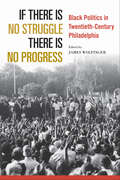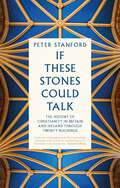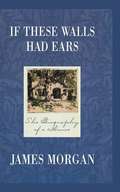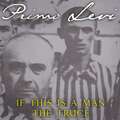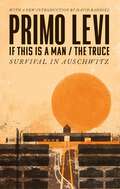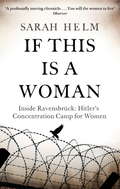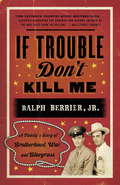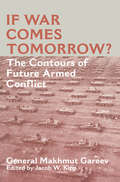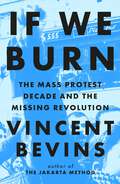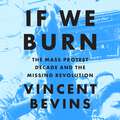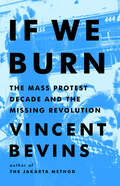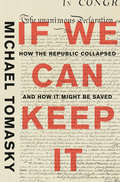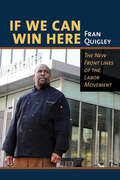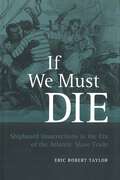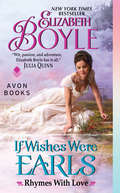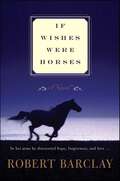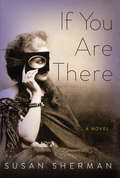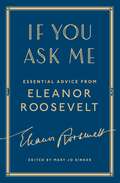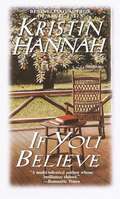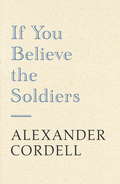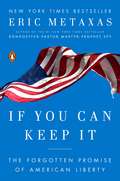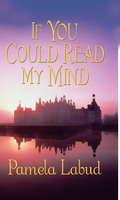- Table View
- List View
If There Is No Struggle There Is No Progress: Black Politics in Twentieth-Century Philadelphia
by James WolfingerPhiladelphia has long been a crucial site for the development of Black politics across the nation. If There Is No Struggle There Is No Progress provides an in-depth historical analysis—from the days of the Great Migration to the present—of the people and movements that made the city a center of political activism. The editor and contributors show how Black activists have long protested against police abuse, pushed for education reform, challenged job and housing discrimination, and put presidents in the White House. If There Is No Struggle There Is No Progress emphasizes the strength of political strategies such as the “Don’t Buy Where You Can’t Work” movement and the Double V campaign. It demonstrates how Black activism helped shift Philadelphia from the Republican machine to Democratic leaders in the 1950s and highlights the election of politicians like Robert N. C. Nix, Sr., the first African American representative from Philadelphia. In addition, it focuses on grassroots movements and the intersection of race, gender, class, and politics in the 1960s, and shows how African Americans from the 1970s to the present challenged Mayor Frank Rizzo and helped elect Mayors Wilson Goode, John Street, and Michael Nutter. If There Is No Struggle There Is No Progress cogently makes the case that Black activism has long been a powerful force in Philadelphia politics.
If These Stones Could Talk: The History of Christianity in Britain and Ireland through Twenty Buildings
by Peter Stanford'A heavenly book, elegant and thoughtful. Get one for yourself and one for the church-crawler in your life!' Lucy WorsleyChristianity has been central to the lives of the people of Britain and Ireland for almost 2,000 years. It has given us laws, customs, traditions and our national character. From a persecuted minority in Roman Britannia through the 'golden age' of Anglo-Saxon monasticism, the devastating impact of the Vikings, the alliance of church and state after the Norman Conquest to the turmoil of the Reformation that saw the English monarch replace the Pope and the Puritan Commonwealth that replaced the king, it is a tangled, tumultuous story of faith and achievement, division and bloodshed.In If These Stones Could Talk Peter Stanford journeys through England, Scotland, Wales and Ireland to churches, abbeys, chapels and cathedrals, grand and humble, ruined and thriving, ancient and modern, to chronicle how a religion that began in the Middle East came to define our past and shape our present. In exploring the stories of these buildings that are still so much a part of the landscape, the details of their design, the treasured objects that are housed within them, the people who once stood in their pulpits and those who sat in their pews, he builds century by century the narrative of what Christianity has meant to the nations of the British Isles, how it is reflected in the relationship between rulers and ruled, and the sense it gives about who we are and how we live with each other.'There is no better navigator through the space in which art, culture and spirituality meet than Peter Stanford' Cole Moreton, Independent on Sunday
If These Stones Could Talk: The History of Christianity in Britain and Ireland through Twenty Buildings
by Peter Stanford'A heavenly book, elegant and thoughtful. Get one for yourself and one for the church-crawler in your life!' Lucy WorsleyChristianity has been central to the lives of the people of Britain and Ireland for almost 2,000 years. It has given us laws, customs, traditions and our national character. From a persecuted minority in Roman Britannia through the 'golden age' of Anglo-Saxon monasticism, the devastating impact of the Vikings, the alliance of church and state after the Norman Conquest to the turmoil of the Reformation that saw the English monarch replace the Pope and the Puritan Commonwealth that replaced the king, it is a tangled, tumultuous story of faith and achievement, division and bloodshed.In If These Stones Could Talk Peter Stanford journeys through England, Scotland, Wales and Ireland to churches, abbeys, chapels and cathedrals, grand and humble, ruined and thriving, ancient and modern, to chronicle how a religion that began in the Middle East came to define our past and shape our present. In exploring the stories of these buildings that are still so much a part of the landscape, the details of their design, the treasured objects that are housed within them, the people who once stood in their pulpits and those who sat in their pews, he builds century by century the narrative of what Christianity has meant to the nations of the British Isles, how it is reflected in the relationship between rulers and ruled, and the sense it gives about who we are and how we live with each other.'There is no better navigator through the space in which art, culture and spirituality meet than Peter Stanford' Cole Moreton, Independent on Sunday
If These Walls Had Ears: The Biography of a Home
by James MorganTells the story of 501 Holly in Little Rock and the seven families that have called it home from the 1920s to the present, recounting personal drama and fond memories against the background of America's social and cultural history. Includes b&w photos. For general readers. No index. Annotation c. by Book News, Inc., Portland, Or.
If This Is A Man/The Truce
by Primo Levi"With the moral stamina and intellectual poise of a twentieth-century Titan, this slightly built, dutiful, unassuming chemist set out systematically to remember the German hell on earth, steadfastly to think it through, and then to render it comprehensible in lucid, unpretentious prose. He was profoundly in touch with the minutest workings of the most endearing human events and with the most contemptible. What has survived in Levi's writing isn't just his memory of the unbearable, but also, in THE PERIODIC TABLE and THE WRENCH, his delight in what made the world exquisite to him. He was himself a magically endearing man, the most delicately forceful enchanter I've ever known" - PHILIP ROTH
If This Is A Man/The Truce: And, The Truce
by Primo LeviWith the moral stamina and intellectual pose of a twentieth-century Titan, this slightly built, duitful, unassuming chemist set out systematically to remember the German hell on earth, steadfastly to think it through, and then to render it comprehensible in lucid, unpretentious prose. He was profoundly in touch with the minutest workings of the most endearing human events and with the most contempible. What has survived in Levi's writing isn't just his memory of the unbearable, but also, in THE PERIODIC TABLE and THE WRENCH, his delight in what made the world exquisite to him. He was himself a "magically endearing man, the most delicately forceful enchanter I've ever known" - PHILIP ROTH
If This Is A Woman: Inside Ravensbruck: Hitler's Concentration Camp for Women
by Sarah HelmWinner of the Longman-History Today Book Prize: A 'profoundly moving chronicle' (Observer) that tells the story of Ravensbrück, the only concentration camp designed specifically for women, using new testimony from survivorsOn a sunny morning in May 1939 a phalanx of 800 women - housewives, doctors, opera singers, politicians, prostitutes - were marched through the woods fifty miles north of Berlin, driven on past a shining lake, then herded through giant gates. Whipping and kicking them were scores of German women guards.Their destination was Ravensbrück, a concentration camp designed specifically for women by Heinrich Himmler, prime architect of the Nazi genocide.For decades the story of Ravensbrück was hidden behind the Iron Curtain and today is still little known. Using testimony unearthed since the end of the Cold War, and interviews with survivors who have never spoken before, Helm has ventured into the heart of the camp, demonstrating for the reader in riveting detail how easily and quickly the unthinkable horror evolved.'It not only fills a gap in Holocaust history but it is an utterly compelling read' Taylor Downing, History Today'A sense of urgency infuses this history, which comes just in time to gather the testimony of the camp's survivors . . . meticulous, unblinking . . . [Helm's] book comes not a moment too soon' The Economist
If This Is A Woman: Inside Ravensbruck: Hitlers Concentration Camp for Women
by Sarah HelmWinner of the Longman-History Today Book Prize: A 'profoundly moving chronicle' (Observer) that tells the story of Ravensbrück, the only concentration camp designed specifically for women, using new testimony from survivorsOn a sunny morning in May 1939 a phalanx of 800 women - housewives, doctors, opera singers, politicians, prostitutes - were marched through the woods fifty miles north of Berlin, driven on past a shining lake, then herded through giant gates. Whipping and kicking them were scores of German women guards.Their destination was Ravensbrück, a concentration camp designed specifically for women by Heinrich Himmler, prime architect of the Nazi genocide.For decades the story of Ravensbrück was hidden behind the Iron Curtain and today is still little known. Using testimony unearthed since the end of the Cold War, and interviews with survivors who have never spoken before, Helm has ventured into the heart of the camp, demonstrating for the reader in riveting detail how easily and quickly the unthinkable horror evolved.'It not only fills a gap in Holocaust history but it is an utterly compelling read' Taylor Downing, History Today'A sense of urgency infuses this history, which comes just in time to gather the testimony of the camp's survivors . . . meticulous, unblinking . . . [Helm's] book comes not a moment too soon' The Economist
If Trouble Don’t Kill Me: A Family’s Story of Brotherhood, War, and Bluegrass
by Ralph Berrier Jr.Making moonshine, working blue-collar jobs, picking fights in bars, chasing women, and living hardscrabble lives ... Clayton and Saford Hall were born in the backwoods of Virginia in 1919, in a place known as The Hollow. Incredibly, they became legends in their day, rising from mountain-bred poverty to pickin' and yodelin' all over the airwaves of the South in the 1930s and 1940s, opening shows for the Carter Family, Roy Rogers, the Sons of the Pioneers, and even playing the most coveted stage of all: the Grand Ole Opry. They accomplished a lifetime's worth of achievements in less than five years-and left behind only a few records to document their existence. Fortunately, Ralph Berrier, Jr. , the grandson of Clayton Hall and a reporter for the Roanoke Times, brings us their full story for the first time in IF TROUBLE DON'T KILL ME. He documents how the twins' music spread like wildfire when they moved from The Hollow to Roanoke at age twenty, and how their popularity was inflamed by their onstage zaniness, their roguish offstage shenanigans, and, above all, their ability to play old-time country music. But just as they arrived on the brink of major fame, World War II dashed their dreams. Berrier follows the Hall twins as they travel overseas, leaving behind their beloved music, and are thrust into the cauldron of a war that reshaped their lives and destinies. Through the brothers' experiences, the story of World War II unfolds-Saford fought from the shores of North Africa to Sicily and Europe and finally into Germany; Clayton fought the Japanese in the brutal Pacific theater until the savage, final battle on Okinawa. They returned home after the war to find that the world had changed, music had changed . . . and they had, too. IF TROUBLE DON'T KILL ME paints a loving portrait of a vanishing yet exalted southern culture, shows us the devastating consequences of war, and allows us to experience the mountain voices that not only influenced the history of music but that also shaped the landscape of America.
If War Comes Tomorrow?: The Contours of Future Armed Conflict (Soviet (Russian) Military Theory and Practice #No. 7)
by General Makhmut GareevMilitary affairs have been affected by major changes in recent years. The bipolar world of two superpowers has gone. The Cold War and the global military confrontation that accompanied it have ended. A new military and political order has emerged in the world, but the world has not become more stable; indeed, wars and armed conflict have become much more common.Forecasting the contours of future armed conflict is no easy task at such times, but this is the primary objective of If War Comes Tomorrow? Focusing on the impact of new technologies, General Gareev considers whether war is still a continuation of politics by other means' or whether the political, ideological, and technical transformation have broken that connection. He explores the linkage between threats to Russian national interests and war as an instrument of policy in great detail and concludes that there is very little prospect either of nuclear war or widespread conventional war. However, he does see local armed conflicts and local wars increasing, with greater emphasis on subversion. He argues that coming decades will see a shift towards a reliance upon indirect means to accomplish limited political ends, and analyses both information warfare and the revolution in military affairs from this perspective.
If We Burn: 'as good as journalism gets'
by Vincent BevinsThis book is phenomenal ... It's about as good as journalism gets ...The highest praise I can give If We Burn is to say that it would be criminally negligent not to read it if you'd like to change the world. - ROB DELANEY Bevins's clear-eyed, sympathetic account of the unfulfilled promise of these protests leaves his reader with a bold vision of the future. - MERVE EMREA stunning history of now. - GREG GRANDINFrom 2010 to 2020, more people took part in protests than at any other point in human history. Why has success been so elusive?From the so-called Arab Spring to Gezi Park in Turkey, from Ukraine's Euromaidan to student rebellions in Chile and Hong Kong, the second decade of the twenty-first century was propelled by explosive mass demonstrations. But few people got what they wanted. In too many cases, the protests led to the opposite of what they asked for.If We Burn is a stirring work of global history built around that strange but fundamental paradox. Acclaimed journalist Vincent Bevins interviewed hundreds of people around the world, and weaves their insights and recollections into a fast-paced, gripping narrative. We follow his own troubling experiences in Brazil, where a protest movement ignited by leftists and anarchists led to an extreme-right government that torched the Amazon.In the mass protest decade, humanity demonstrated a deep desire for change, and brave individuals started something that has been left unfinished. In this ground-breaking study of an extraordinary chain of events, protesters and major actors offer urgent lessons for those who wish to understand geopolitics today, and create a better world tomorrow.
If We Burn: 'as good as journalism gets' - Rob Delaney
by Vincent BevinsFrom 2010 to 2020, more people took part in protests than at any other point in human history. Why has success been so elusive?From the so-called Arab Spring to Gezi Park in Turkey, from Ukraine's Euromaidan to student rebellions in Chile and Hong Kong, the second decade of the twenty-first century was propelled by explosive mass demonstrations. But few people got what they wanted. In too many cases, the protests led to the opposite of what they asked for.If We Burn is a stirring work of global history built around that strange but fundamental paradox. Acclaimed journalist Vincent Bevins interviewed hundreds of people around the world, and weaves their insights and recollections into a fast-paced, gripping narrative. We follow his own troubling experiences in Brazil, where a protest movement ignited by leftists and anarchists led to an extreme-right government that torched the Amazon.In the mass protest decade, humanity demonstrated a deep desire for change, and brave individuals started something that has been left unfinished. In this ground-breaking study of an extraordinary chain of events, protesters and major actors offer urgent lessons for those who wish to understand geopolitics today, and create a better world tomorrow.(P) 2023 Hachette Book Group
If We Burn: The Mass Protest Decade and the Missing Revolution
by Vincent BevinsThe story of the recent uprisings that sought to change the world - and what comes next From 2010 to 2020, more people participated in protests than at any other point in human history. Yet we are not living in more just and democratic societies as a result. IF WE BURN is a stirring work of history built around a single, vital question: How did so many mass protests lead to the opposite of what they asked for? From the so-called Arab Spring to Gezi Park in Turkey, from Ukraine&’s Euromaidan to student rebellions in Chile and Hong Kong, acclaimed journalist Vincent Bevins provides a blow-by-blow account of street movements and their consequences, recounted in gripping detail. He draws on four years of research and hundreds of interviews conducted around the world, as well as his own strange experiences in Brazil, where a progressive-led protest explosion led to an extreme-right government that torched the Amazon. Careful investigation reveals that conventional wisdom on revolutionary change is gravely misguided. In this groundbreaking study of an extraordinary chain of events, protesters and major actors look back on successes and defeats, offering urgent lessons for the future.
If We Can Keep It: A Brief, 300-year History Of The Fall Of The Republic
by Michael TomaskyA game-changing account of the deep roots of political polarization in America, including an audacious fourteen-point agenda for how to fix it. Why has American politics fallen into such a state of horrible dysfunction? Can it ever be fixed? These are the questions that motivate Michael Tomasky’s deeply original examination into the origins of our hopelessly polarized nation. “One of America’s finest political commentators” (Michael J. Sandel), Tomasky ranges across centuries and disciplines to show how America has almost always had two dominant parties that are existentially, and often violently, opposed. When he turns to our current era, he does so with striking insight that will challenge readers to reexamine what they thought they knew. Finally, not content merely to diagnose these problems, Tomasky offers a provocative agenda for how we can help fix our broken political system—from ranked-choice voting and at-large congressional elections to expanding high school civics education nationwide. Combining revelatory data with trenchant analysis, Tomasky tells us how the nation broke apart and points us toward a more hopeful political future.
If We Can Win Here: The New Front Lines of the Labor Movement
by Fran QuigleyDo service-sector workers represent the future of the U.S. labor movement? Mid-twentieth-century union activism transformed manufacturing jobs from backbreaking, low-wage work into careers that allowed workers to buy homes and send their kids to college. Some union activists insist that there is no reason why service-sector workers cannot follow that same path. In If We Can Win Here, Fran Quigley tells the stories of janitors, fry cooks, and health care aides trying to fight their way to middle-class incomes in Indianapolis. He also chronicles the struggles of the union organizers with whom the workers have made common cause. The service-sector workers of Indianapolis mirror the city's demographics: they are white, African American, and Latino. In contrast, the union organizers are mostly white and younger than the workers they help rally. Quigley chronicles these allies' setbacks, victories, bonds, and conflicts while placing their journey in the broader context of the global economy and labor history. As one Indiana-based organizer says of the struggle being waged in a state that has earned a reputation as antiunion: "If we can win here, we can win anywhere." The outcome of the battle of Indianapolis may foretell the fate of workers across the United States.
If We Must Die: Shipboard Insurrections in the Era of the Atlantic Slave Trade (Antislavery, Abolition, and the Atlantic World)
by Eric Robert TaylorIf We Must Die examines nearly five hundred shipboard rebellions that occurred over the course of the entire slave trade, directly challenging the prevailing thesis that such resistance was infrequent or insignificant. As Eric Robert Taylor shows, though most revolts were crushed quickly, others raged on for hours, days, or weeks, and, occasionally, the Africans captured the vessel and returned themselves to freedom. In recounting these rebellions, Taylor suggests that certain factors like geographic location, the involvement of women and children, and the timing of a shipboard revolt, determined the difference between success and failure. Taylor also explores issues like aid from other ships, punishment of slave rebels, and treatment of sailors captured by the Africans. If We Must Die expands the historical view of slave resistance, revealing a continuum of rebellions that spanned the Atlantic as well as the centuries. These uprisings, Taylor argues, ultimately helped limit and end the traffic in enslaved Africans and also served as crucial predecessors to the many revolts that occurred subsequently on plantations throughout the Americas.
If Wishes Were Earls
by Elizabeth BoyleWhen you wish upon an earl . . .Harriet Hathaway has only ever wanted one man: the Earl of Roxley. After a passionate interlude at a house party, Harriet is convinced Roxley will do the right thing and propose. But when she returns to London, she finds the roguish earl on the verge of proposing to another.Yet Harriet refuses to believe that her hopes of a happily-ever-after are completely lost--for she can see the desire still flickering in the earl's eyes when he looks at her from across the dance floor. And when they are alone . . . there is one wish neither can deny.. . . the most extraordinary things can happenThe Earl of Roxley is in a dangerous fix--and to keep Harriet safe, he must hold her at arm's length. He won't entangle her in the murderous mystery that is threatening to destroy his family and his future. But keeping Harriet Hathaway out of his troubles proves as impossible as it is to keep the determined beauty from stealing his heart.
If Wishes Were Horses: A Novel
by Robert BarclayIn the spirit of Nicholas Sparks comes If Wishes Were Horses. Author Robert Barclay has crafted a deeply moving story of love, hope, and forgiveness, as two damaged souls torn apart by a common tragedy slowly find a way to heal. Destined to be a much-beloved classic on a par with Robert James Waller's The Bridges of Madison County, Barclay's If Wishes Were Horses is a story rich in emotion that will touch the heart of every reader who fervently believes in second chances at love.
If You Are There: A Novel
by Susan ShermanSet in the early 1900s, the novel follows young Lucia Rutkowski who, thanks to the influence of her beloved grandmother, escapes the Warsaw ghetto to work as a kitchen maid in one of the wealthiest neighborhoods in the bustling city of Paris. Too talented for her lowly position, Lucia is thrown out on the street. Her only recourse is to take a job working for two disorganized, rather poor married scientists so distracted by their work that their house and young child are often neglected. Lucia soon bonds with her eccentric employers, watching as their work with radioactive materials grows increasing noticed by the world, then rising to fame as the great Marie and Pierre Curie. Soon, all of Paris is alit with the news of an impending visit from Eusapia Palladino, the worlds most famous medium. It is through her now famous employers that Lucia attends Eusapias gatherings and eventually falls under the mediums spell, leaving the Curie household to travel with her to Italy. Ultimately, Lucia is placed directly in the crosshairs of faith versus science –what is more real, the glowing substances of the Curie laboratory or the glowing visions that surround the medium during her seance?
If You Ask Me: Essential Advice from Eleanor Roosevelt
by Eleanor Roosevelt Mary Jo BinkerExperience the timeless wit and wisdom of Eleanor Roosevelt in this annotated collection of candid advice columns that she wrote for more than twenty years.In 1941, Eleanor Roosevelt embarked on a new career as an advice columnist. She had already transformed the role of first lady with her regular press conferences, her activism on behalf of women, minorities, and youth, her lecture tours, and her syndicated newspaper column. When Ladies Home Journal offered her an advice column, she embraced it as yet another way for her to connect with the public. “If You Ask Me” quickly became a lifeline for Americans of all ages. Over the twenty years that Eleanor wrote her advice column, no question was too trivial and no topic was out of bounds. Practical, warm-hearted, and often witty, Eleanor’s answers were so forthright her editors included a disclaimer that her views were not necessarily those of the magazines or the Roosevelt administration. Asked, for example, if she had any Republican friends, she replied, “I hope so.” Queried about whether or when she would retire, she said, “I never plan ahead.” As for the suggestion that federal or state governments build public bomb shelters, she considered the idea “nonsense.” Covering a wide variety of topics—everything from war, peace, and politics to love, marriage, religion, and popular culture—these columns reveal Eleanor Roosevelt’s warmth, humanity, and timeless relevance.
If You Believe
by Kristin HannahMad Dog Stone was a carefree drifter, a man who loved life on the open road and never looked back. Mariah Throckmorton was lonely and frightened, hiding from a past filled with heartbreak and scandal. A man in need of love, a woman in need of laughter--He wandered onto her quiet apple farm in search of a few days' work, threatening her peace of mind and stirring the hot, passionate emotions she tried so hard to hide. Theirs was a love born against all odds, impossible to count on, _ impossible to hold. Together they would face the heartache of loss, the price of passion, the aftermath of betrayal. For only then would they learn the bittersweet truth--that love exists only if you believe. ....
If You Believe The Soldiers
by Alexander CordellBritain in the mid-1980s is a country in the grip of a brutal fascist regime. There is rioting in the streets, cold-blood massacres by extremist political groups, attempted coups by liberating forces based on the continent. Mak Seaton is a senior civil servant whose strengths and weaknesses are bound up in the view that his duty is to the ruling faction. But when Seaton uncovers evidence of corruption at the highest levels of power, even his wealth and position cannot protect him from the Triumvirate.
If You Believe The Soldiers
by Alexander CordellBritain in the mid-1980s is a country in the grip of a brutal fascist regime. There is rioting in the streets, cold-blood massacres by extremist political groups, attempted coups by liberating forces based on the continent.Mak Seaton is a senior civil servant whose strengths and weaknesses are bound up in the view that his duty is to the ruling faction. But when Seaton uncovers evidence of corruption at the highest levels of power, even his wealth and position cannot protect him from the Triumvirate.
If You Can Keep It: The Forgotten Promise of American Liberty
by Eric Metaxas#1 New York Times bestselling author Eric Metaxas delivers an extraordinary book that is part history and part rousing call to arms, steeped in a critical analysis of our founding fathers' original intentions for America.In 1787, when the Constitution was drafted, a woman asked Ben Franklin what the founders had given the American people. "A republic," he shot back, "if you can keep it." More than two centuries later, Metaxas examines what that means and how we are doing on that score.If You Can Keep It is at once a thrilling review of America's uniqueness--including our role as a "nation of nations"--and a chilling reminder that America's greatness cannot continue unless we embrace our own crucial role in living out what the founders entrusted to us. Metaxas explains that America is not a nation bounded by ethnic identity or geography, but rather by a radical and unprecedented idea, based on liberty and freedom for all. He cautions us that it's nearly past time we reconnect to that idea, or we may lose the very foundation of what made us exceptional in the first place.From the Hardcover edition.
If You Could Read My Mind
by Pamela LabudDream Lover. . . The son of an English lord and Gypsy princess, Tristan Deveraux has made his gift of telepathy bearable by helping wounded soldiers on the battlefields of Spain. But his commanding officer suspects Tristan's ability, and forces him to escort a brilliant scientist and his niece back to England.With her uncle's life in danger, Emily Durbin is shocked by the small company of men assigned to them, especially the handsome, enigmatic surgeon's apprentice who seems to read her every thought--and invades her dreams with promises of a passion stronger than she has ever known...But someone is desperate to kill the scientist and possess Emily at all costs. With an enemy in their midst, Tristan and Emily embark on a perilous journey home, and an even more dangerous one into the deepest reaches of the mind--and heart...
